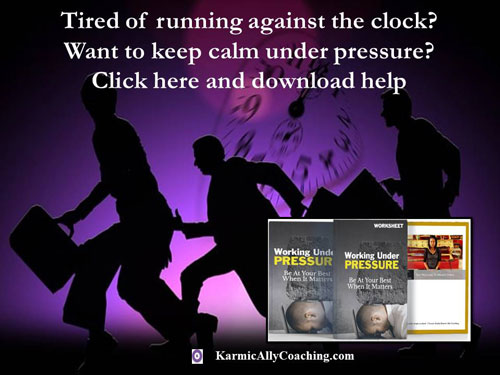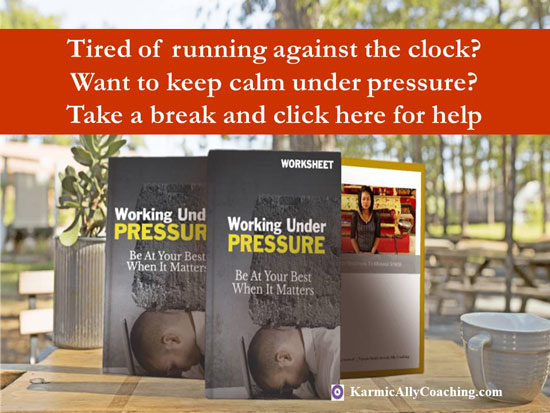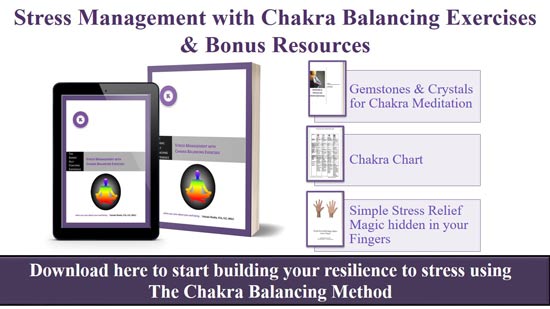
Experiencing high pressure isn’t only for the workplace. It can happen in any area of our lives.
The undeniable fact is that we are living in a world filled with both stress and pressure.
There are so many things we feel we need to accomplish in a day. This leads to the feeling like there aren’t enough hours in that day to do what needs to get done.
We have responsibilities at work and responsibilities to our loved ones.
We also have responsibilities to ourselves.
Then there are times when we get an added responsibility. Caring for a loved one or pet who’s fallen ill becomes a priority also adds to stress and pressure.
All these various responsibilities can carry a heavy emotional and physical weight. If we don’t finish everything that is making a demand on our attention, we feel that we have somehow failed. We’ve let ourselves, or someone we care about, down.
Even though we know that others are also experiencing their own version of stress or pressure, we still compare ourselves with them. We forget that we all have our own situation to deal with.
Yet when we don’t accomplish as much as they do in the time allotted then, again, we feel that we’ve failed.
Technology is a key component that drives all this pressure and stress
When I talk about technology, it isn’t just social media that is also available on apps to feed our FOMO habit.
Phones, tablets and computers keep all of us virtually tethered together, in a lockstep towards achieving goals.
We are instantaneously informed about how much so and so got done today, or how someone else finished a big project ahead of schedule or, worse yet, how another person missed a deadline and suffered the consequences.
This constant stream of other people’s personal and professional information acts as a goad. It makes us feel that any down time is the equivalent of wasted time. Unable to relax and unable to stop worrying, we become overwhelmed by ever growing levels of pressure and stress.
Yet, it doesn’t have to be this way.
While we can’t change the society we live in, we can change our own behaviors and how we look at and deal with the world.
We can be proactive, instead of reactive. We can be positive, instead of negative.
It’s in our power to develop an outlook and lifestyle that allows us to achieve our goals while minimizing or ameliorating the toxic effects that are the byproducts of modern life.
That’s why even though I’ve written about stress and pressure in the past, there’s still much to be discussed.
I will explain the difference between stress and pressure. (Yes, they are different.)
We’ll look at 2 easy techniques to effectively reduce and eliminate stress and pressure, allowing you to live a healthier and happier life.
So, let’s get started!
The Difference between Stress and Pressure
Many people use the words pressure and stress interchangeably. They might say that they are totally stressed out by a presentation they have to make the next day.
Or that the pressures of all the responsibilities they have at work are really getting to them.
In reality, stress and pressure are two very different things.
Stress is what occurs when too many demands are made on our time or attention. When this occurs, we feel hurried and spread too thin.
This is because in a stressful situation we don’t have enough resources, be it time, money, energy, etc., to deal with all the demands. So, you could say that stress is task intensive, resource deficient situation.
Pressure, on the other hand, occurs when a personal or professional result or outcome depends on individual performance. Typically, a pressure situation arises out of a single situation.
You have to make the shot to win the game. You’re only going to get one chance to impress the client. In a pressure situation, it all comes down to one person and one moment.
The twofold reason pressure and stress typically get confused
First, pressure can be a subset of greater stress. In other words, you can be pressured by one single situation that calls for your best performance.
However, that single situation can be a part of a group of demands on your time and attention that, altogether, is causing you stress.
Second, although they are different, stress and pressure tend to produce similar physical and psychological effects in people.
We’re all familiar with the effects – fear, shallow breathing, a sense of dread, upset stomach, and an elevated heart rate are common.
The effects are the same because both pressure and stress trigger the flight or fight response.
We are programmed to either fight things that we sense are dangerous or run away from them. The physical and mental effects we feel when stressed or pressured are the manifestations of this reflex.
The good news is that we can learn how to control and minimize these negative feelings so that they no longer interfere with our lives, health and performance.
We are now going to turn our attention to two of the easiest and most important ways to manage stress and pressure in your own life.
Together, these practices become powerful tools that can be used anywhere, anytime to reduce the negative effects of pressure and stress.
Breathe to manage your stress or pressure response
I’ve covered this before with techniques in my post on breath work to manage stress but it warrants more attention.
Breathing is a part of our autonomic nervous system. In simple terms, this means that we breathe without having to think about it. Our brains adjust our respiration to fit our level of activity.
Our brains automate our breathing so that we’re free to do other things. However, sometimes this situation doesn’t work out as planned.
When we’re stressed or pressured and the flight or fight reaction is triggered, our brains response is to act as if we are in mortal danger. This means that our breathing automatically becomes shallower and more rapid.
This breathing pattern, in turn, reinforces the idea that we’re about to engage in a fight for our lives. The more we breathe this way, the more stressed and pressured we feel.
A way to break this cycle is to intentionally take the controls of our respiration from the unconscious to the conscious.
We can do this by intentionally breathing slower and more deeply. When we breathe slow and deep, we send a signal to the brain that we are not actually in danger. This interrupts the fight or flight reaction and reduces the physical and mental effects of stress and pressure that we are experiencing.
One of the best ways to perform this pattern interrupt is with what’s known as a cleansing breath.
To perform a cleansing breath, simply exhale completely while counting slowly to four. Next inhale slowly and completely while counting to seven. Hold your breath for a moment and then exhale again while performing another slow four count.
This is one breath cycle. Repeat as necessary, until you begin to feel more relaxed, calmer, less stressed or pressured and more in control.
Tap into the power of Meditation – Say Om
One of the best ways to manage pressure and stress, or more specifically the effects of pressure and stress, is to meditate.
The practice of meditation is ancient, going back thousands of years. Modern medicine has documented the physical advantages of this ancient practice when it comes to stress and pressure relief.
I personally practice Transcendental Meditation as well as other forms depending on the situation.
One of the first things to understand about meditation is that it is easy to do.
You don’t need to assume a certain position to make it work or chant.
You don’t need years of practice to see positive effects.
What you do need is a quiet room and a comfortable position in order to begin to clear your mind. Simply sit (or stand or lay) and concentrate on removing all stray thoughts from your mind.
Your goal is to still that little voice inside your head. When a stray thought pops up, banish it by refusing to follow the thought.
Keep this up and, over time, you’ll find that when your mind becomes quiet, you emerge from meditating feeling calmer, more focused, happier and more in control.
Meditation works by altering your brain wave frequency
Normally, when we are awake, our brains are operating in a high frequency mode, known as beta wave. In this state, we are focused outward, looking at the world. We are receiving information, processing this information and behaving accordingly.
What we are doing, biologically, in a beta state is surviving. We view the world looking for dangers and opportunities. It is a highly reactive brain state and it is the brain state that we experience when under pressure or stress.
When we meditate, we intentionally slow our thought processes down. We slow down the brain, making it less reactive and more reflective.
When the brain slows down, the brainwave state changes from beta waves to alpha waves and then to theta waves.
Each subsequent state is calmer and more relaxed than the previous state, so that by the time a theta state is achieved nearly all of the negative effects of stress and pressure have been minimized or eliminated entirely.
When you emerge from a session of meditation, the theta state is maintained for some time. Because you have actually rewired your brain, you are able to look at the world in a completely different way.
You begin to see solutions where before you saw problems. You begin to see opportunities where before you saw obstacles.
In short, you begin to live a stress and pressure free life.
Take your efforts to deal with high pressure and stress further with 2 of my popular resources.
If you need to manage your workplace situation, then I recommend Working Under Pressure.
For a more holistic approach, get my Stress Management with Chakra Balancing Exercises pack.






 I adhere to the Certified Coaches Alliance Code of Ethics and Standards. A copy is available on request.
I adhere to the Certified Coaches Alliance Code of Ethics and Standards. A copy is available on request.
 Let's Talk through the Connect Form:
Let's Talk through the Connect Form: